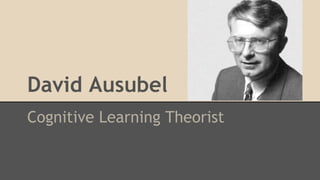
David Ausubel
- 1. David Ausubel Cognitive Learning Theorist
- 2. Meet David Ausubel David Ausubel was born in Brooklyn, New York in 1918. He graduated from the University of Pennsylvania with a degree in psychology. He earned a PH D in developmental psychology from Columbia University. Ausubel published multiple books and articles on developmental and educational psychology. In 1976 he received the Thorndike Award from the American Psychological Association for "Distinguished Psychological Contributions to Education". Dr. David Ausubel passed away on July 9, 2008.
- 3. Views of Learning David Ausubel was a cognitive learning theorist who believed that what a student already knows is the determining factor of what can and should be learned next. Learners seek to make sense of their interactions by attaching new knowledge with that which they already know. For Ausubel, learning is “bringing something new into our cognitive structure and attaching it to our existing knowledge that is located there” (Hannum, 2005). This was the focus of his work.
- 4. Learning Application Teacher’s Role: The teacher’s primary role is to present the information in a way that is meaningful to the student. This can only be achieved if a teacher is aware of what a child already knows. Materials must be presented in its final form. Student Role: Ausubel encouraged receptive learning, rather than student-centered learning such as discovery learning. Students play an active role because they are the ones who must take in the new information, make connections in their cognitive structures, and make links amongst concepts. In doing this, students are the ones who make learning meaningful.
- 5. How to Spot Ausubel at Work in a Classroom 1. Advanced Organizers: This is a tool widely used in classrooms today to activate relevant knowledge and make connections with the new materials that are to be assimilated into existing cognitive structures. He emphasized starting with the “big picture” of a subject and filling in the details later. 2. Pretesting: This is done in order to understand exactly what students know. 3. Student Grouping: Students with matching prior knowledge about a subject should be grouped together. 4. Differentiated Direct Instruction: Instruction must match a student’s pre-existing knowledge. Individual differences must guide teaching.
- 6. Theories of Learning Ausubel DISAGREED With Rote Learning: Learning that does not make meaningful cognitive connections will be easily forgotten. Discovery Learning: Ausubel sees no advantage to discovery learning. It takes longer and students may discover information that is wrong, therefore learning incorrectly. Readiness to Learn: Readiness to learn has nothing to do with a stage of development, rather only with pre-existing knowledge in their cognitive structures. Motivation is not a precursor to learning: “Motivation is more a result or outcome of instruction rather than a cause of it” (Hannum, 2005). Students do not require motivation to learn.
- 7. Comparisons to Other Learning Theorists Ausubel’s work has been compared to Bruner. They both held similar views of the hierarchical nature of knowledge. Ausubel was influenced by Piaget’s work on cognitive development. Similar to Skinner, Ausubel believed practice is very important in learning, although they disagree on why and how it works.
- 8. Where I Stand With Ausubel I agree with most of Ausubel’s findings on cognitive learning, and have used most of his suggestions in my classroom settings to a certain degree at one time or another. I have used student grouping on a regular basis in which students are grouped according to similar levels of understanding in a particular subject area. Pretesting students has aided me in forming appropriate groups. Through this grouping, I was able to achieve differentiated direct instruction that was suited for each group’s level of knowledge. Most lessons that I teach start with the “big picture” in order to let students know where we are going in our learning and to draw them in by connecting it to their background knowledge. Though I have dabbled in the use of advanced organizers in my classroom, I have not used them to the extent in which Ausubel would have me on a daily basis. How are the theories of Ausubel at work in your classroom setting?
- 9. How Does Ausubel Fit With Our Schiro Learnings? In relation to our learnings of curriculum theories presented in Michael Schiro’s book, Ausubel would be most aligned to the scholar academic ideology. This is concluded by his focus on how students learn in the cognitive developments of their minds in order to understand the school subjects, which is a similar goal of scholar academics. For example, “underlying the scholar academic ideology is a belief that man’s essence is summed up by his ability to think, to understand, to reason, to reflect...in short, to exercise the intellectual capabilities of his mind in his endeavor to understand his world” (Schiro, 2013 p. 24). Furthermore, in the scholar academic ideology, the focus is on the “rational or intellectual aspects of the child’s mind” (Schiro, 2013 p. 45), as is the concern with Ausubel. Just as scholar academics encourages student “grouping by achievement” in order for “teachers to tailor instruction so that everyone is suitably challenged” (Schiro, 2013 p. 48) so to does David Ausubel. The connections between Ausubel and the scholar academic ideology are numerous, although specific differences exist.
- 10. References Ausubel, David P. Retrieved (March 20, 2015) from http://www.davidausubel.org/index.html. Cooper, Sunny. “Theories of Learning in Educational Psychology,” (2009). Retrieved (March 17, 2015) from http://www.lifecircles-inc.com/index.html. Hannum, Wallace. “David Ausubel’s Theory.” Learning Theory Fundamentals, (2005). Retrieved (March 17, 2015) from http://www.theoryfundamentals.com/index.html. Schiro, M.S. (2013). Curriculum theory: Conflicting visions and enduring concerns, (2nd ed.). Sage